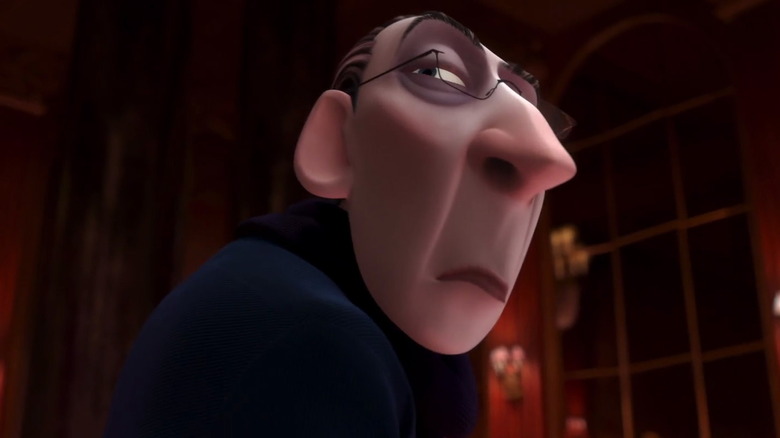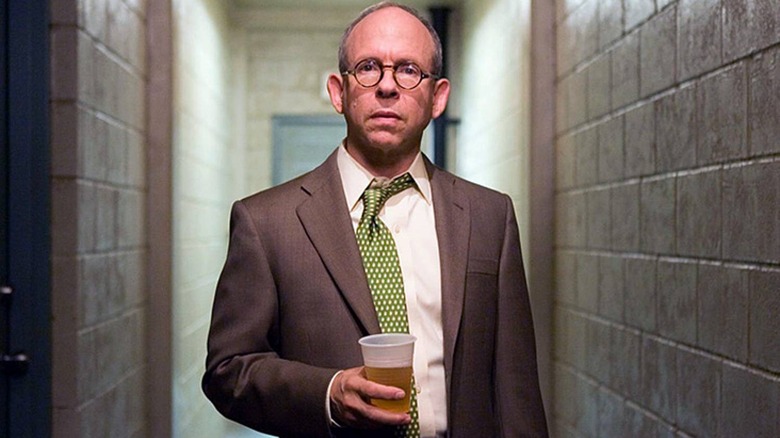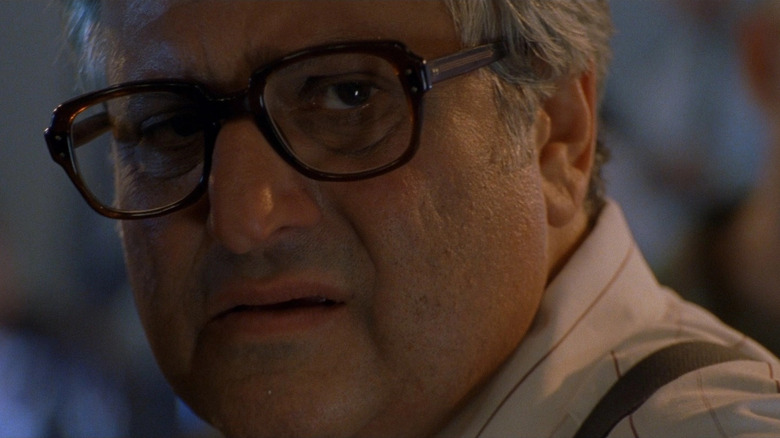Everything Wrong With Treating Online Comedic Criticism As Actual Film Criticism
(Welcome to The Soapbox, the space where we get loud, feisty, political, and opinionated about anything and everything.)
On December 11, 2012, the very first CinemaSins video — "Everything Wrong With The Amazing Spider-Man in 2 Minutes or Less" — was uploaded onto YouTube, sparking an online sensation that still persists to this day. In it, creators Jeremy Scott and Chris Atkinson lay out — in a matter-of-fact, fast-talking patois — a litany of perceived errors and flaws in Marc Webb's 2012 superhero movie, starting with a mere, "This movie exists." As the video continues, each error or "sin" is added to a counter in the upper lefthand corner of the screen, while a timer runs in the upper right. At the end of the video, "The Amazing Spider-Man" is given a "Movie Sin Tally" — a grand total of 53 sins — and a sentence to HELL.
In the interim decade, Cinema Sins has uploaded over 900 videos in their "Everything Wrong With..." series, with many of them running over 20 minutes apiece. Their channel has over 9 million subscribers, and Scott and Atkinson have become celebrities. It warrants immediate mention that CinemaSins has also been widely lambasted by both viewers and filmmakers — with Rian Johnson, C. Robert Cargill, Damon Lindelof, and Jordan Vogt-Roberts having chimed in — for affecting a snarky, dismissive attitude toward film, listing utterly trivial details as "sins," thereby reducing movies to their literal, base components rather than engaging with them as complete works of art. Over CinemaSins' tenure, several essays have been written about how Cinema Sins' "Everything" videos are bad for criticism.
The common argument in favor of CinemaSins is that they are presenting a form of satire. The show's creators are affecting an exaggerated version of unengaged, primordial, lizard-brain reactions to giant commercial entertainments — the kind you might find in a filth pit like 4Chan — and are deliberately reducing the ordinarily composed and well-considered medium of film criticism into a literal scoreboard. The issue with defending CinemaSins as satire is that ... it may not be satire. It may just be a way to whine about movies. It's Poe's Law in effect; toxic, bad-faith film criticism has gotten so pervasive that it's become impossible to satirize. Personally, I find the videos to be jejune either way, as I am no longer 12.
It's important to acknowledge, however, that CinemaSins isn't engaging in criticism. However successfully or unsuccessfully they are doing it, they are creating comedy.
Jonathan Swift vs. Mr. Cranky
CinemaSins is hardly the only team or comedian to engage in this form of comedy. Using the modern language and format of film criticism as a stage for comedy is a tradition that goes back to the early days of the internet. The New Yorker's Libby Gelman-Waxner (actually author Paul Rudnik) certainly counts as a satire of celebrity journalism.
More salient to this article: In 1995, the website MrCranky.com was launched, featuring a long series of film reviews wherein films were rated on a scale of one to five bombs rather than stars. Mr. Cranky (actually writers Jason Katzman and Hans Bjordahl) "hated" everything, and would rave about recent pop cinema as if every single film he watched was hurting him personally. Perhaps irony was more pervasive in 1995, but Mr. Cranky was widely and easily accepted as satire. In 2000, Wired ran a profile on Mr. Cranky, pointing out his unique form of satire.
Since 2000, the "cranky critic" has become an online institution, and more and more comedic critics have arisen in 20 years. Libby Gelman-Waxner, Doug Walker (AKA the Nostalgia Critic), Honest Trailers, Pitch Meeting, and Mr. Plinkett at Red Letter Media all engage in a similar activity with varying degrees of success. This is part of a new comedy school that currently doesn't have a name. Comedy Criticism? Critical satire? Analytical parody?
Mind you, I refer not to Swiftian satire, which presents ironic, deadpan criticisms of society couched in shocking language (as in "A Modest Proposal," which encouraged inter-class cannibalism). Nor am I referring to criticizing comedians, dissecting how jokes work and analyzing what a comedian's messaging might be. I refer to a very particular type of comedy that uses the structure of a film review, and perhaps affects the (perceived) Olympian attitude of a critic, but presents a review with deliberately dubious earnestness, intentionally exaggerating a negative opinion or toxic reaction to a film to comedic effect.
And that's fine, but...
Mind you, as a critic, I have no conceptual issue with using the format and language of film criticism as a basis for comedy bits. Criticism can be quite formal and can often read as exceedingly intellectually oblique: Yes, we critics can get a little highfalutin and grandiloquent at times. Intrinsically mocking us with comedy — taking us down a peg by implying we hate everything we see — is quite fair. We wouldn't be very good critics if we didn't take criticism of ourselves seriously.
So this is not an essay devoted to defending my ego, nor the purity of my craft. Seriously, if comedy is your tool, have at us. The issue with "cranky criticism" (a term I will adopt for the purposes of this article) comes when readers begin to conflate it with the real thing.
Irony is vital to the format of comedy criticism. A viewer has to be able to instantly intuit a certain level of sarcasm in order to accept the "joke" that an opinion is being exaggerated, or is being deliberately insincere. Mr. Cranky likely didn't hate every film he saw, and in calling himself "Mr. Cranky," readers were clued into his false persona and the comedic tone of hostility he was sliding into. Do the people at "Everything Wrong With..." really hate every film they see? Probably not. What does "Honest" refer to in Honest Trailers? That "honesty" is, in fact, based in after-the-fact critical or fan consensus, freeing the all-grand-all-the-time tone of mainstream film advertising from its insidious positivity.
Then, once the satirical framework is set, some earnest criticism can be sneaked in. While the cranky critic Mr. Plinkett (on Red Letter Media) may be complaining about how he vomited in the theater while watching a "Star Wars" prequel film or the 2016 "Ghostbusters" reboot, he also takes the time to point out bad editing habits that filmmaker George Lucas seems to have, the definition of tone, what makes for a functional protagonist in a fantasy film, the nature of comedy, and expresses legitimate issues he might have with the film's generally confusing plot. When wielded well, cranky criticism can serve as a clever, sarcasm-inflected form of the medium.
When wielded badly, however, it's hard to distinguish from bad faith.
Mistrust in critics, racism, sexism
Because "Everything Wrong With..." is so sloppy in its presentation of sarcasm, one may think that the writers actually do hate every film they watch, or that they really do feel that tiny errors, plot holes, and very slight character inconsistencies are what make a film bad.
(For the record, every fictional film has plot holes. If the film isn't engaging with you on a tone, character, action, or story level, your mind begins to wander, and only then do you notice the plot holes. The holes themselves aren't the issue. The film's failure to fully engage your attention is.)
Not that critics were ever the most popular class of writer, but in recent years, general mistrust of critics seems to have mushroomed. Thanks to the recordable numerical critical consensus gleaned from websites like Rotten Tomatoes and CinemaScore, film viewers now have — what they feel — is an objective fact about a film. If it's 95% "fresh" on Rotten Tomatoes, the 5% are now "wrong." We critics regularly face accusations of bribery because our opinion didn't fall in line with the mainstream, or that our political dispositions have driven us to dishonesty. Without our integrity, critics are nothing, and our integrity is constantly questioned by readers who feel that we're constantly lying for one reason or another.
The waters are further muddied by "cranky critics" who are very much presenting exaggerated or even dishonest opinions. The waters are muddied even muddier when readers and viewers begin to see the "fake" exaggerated outrage from comedy sites as a legitimate form of criticism.
Separating the wheat from the chaff
Indeed, many fans of series like "Everything Wrong With..." now think that's what critical discourse ought to look and sound like. Because a common facet of cranky criticism in an obsession with small details, plot holes, and character flaws, fans of the genre are being taught that that obsession is the only way to engage with a film. Cranky criticism discourages actual critical discourse, and even basic film comprehension, favoring whinging over analysis. Indeed, a small detail dissected by a cranky critic may indeed prove to be vital or wise when viewed as a mere aspect of a larger artwork. An non-comedy critic may hate a film, and they may fret and bewail appalling minutiae, but they will — of they're doing their jobs correctly — explain in detail why they felt the way they did, and why a film failed in their eyes. "This film made me puke" is but the beginning of a conversation, not the end of it.
For the health of critical discourse, we should learn to separate the analytical wheat from the comedic chaff. We need to openly distinguish between earnest criticism, and the comedy based criticism of performative outrage.
And we need to start with a term. Something to separate the honest from the comedic. "Cranky criticism" was a fine place-holder for the purposes of this essay, but it's not quite descriptive enough. Analytical satire, suggested by a colleague, is good. Comedy of Criticism is a bit too ungainly.
I entertain suggestions.




